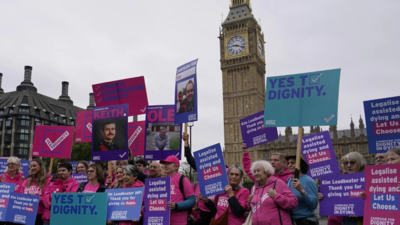
A bill to legalise
assisted dying
in England and Wales was put forward in the
UK parliament
on Wednesday, raising concern among high-ranking religious figures and those who oppose the practice. The proposed legislation has prompted concerns about its potential consequences.
Members of Parliament in the House of Commons will be allowed to vote freely on the Terminally Ill Adults (End of Life) Bill, introduced by Labour MP
Kim Leadbeater
.
This means they can vote according to their personal beliefs rather than following party lines.
An official told AFP that the current version of the bill would necessitate a patient's request to end their life to be approved by a judge and two medical professionals. Additionally, it would only apply to individuals with a life expectancy of six to 12 months.
Supporters and critics of changing the law voiced their opinions outside parliament, where an assisted dying bill was last debated and rejected in the Commons in 2015.
‘Needs to change…’
Leadbeater argues that her proposed legislation aligns with the evolving public sentiment regarding assisted dying. Several European nations have already legalized the practice to varying extents, indicating a growing acceptance of the concept.
She assured that there would be "very robust, very secure safeguards" in place, emphasising that the primary focus of the change was to provide people with more choices at the end of their lives.
"This is not about disabled people. It's not about old people. It's about people who are terminally ill and the rights that I believe they should have," she told AFP.
"At the heart of this is the fact that at the moment, people are taking their lives, losing their lives in really difficult circumstances, and that needs to change," she added.
Could have given "dignity"
Anil Douglas, 39, stated that an assisted dying law could have given his father "safety" and "dignity" in his final moments.
"It was a very lonely, dangerous, isolated death. He was forced to take very drastic action behind closed doors and couldn't discuss his decision with any of us that loved him," he said.
'Dangerous': Opposition on the proposal
Disability rights groups and Cardinal Vincent Nichols, the highest-ranking Roman Catholic cleric in the UK, are among those who oppose the bill. Nichols has encouraged his followers to write to their MPs to express their opposition to the proposed change.
Archbishop of Canterbury Justin Welby, on Tuesday evening the leader of the global Anglican communion, referred to the proposal as a "dangerous... slippery slope" that could be used by individuals who are not terminally ill.
As one of the 26 "lords spiritual," senior Church of England clerics who sit in the House of Lords, Welby will have a vote on the issue.
Alistair Thompson from Care Not Killing, an anti-euthanasia organisation, also expressed concern that changing the law could lead the country to follow the examples of Belgium and the Netherlands, both of which have extended assisted dying to minors.
"We know that introducing an assisted suicidal euthanasia bill would put a lot of people under pressure to end their lives prematurely," he told AFP.
The bill is expected to be debated and voted on by MPs on November 29. The outcome is uncertain, as Leadbeater introduced it as a private member's bill rather than as part of the government's legislative agenda.
Starmer has previously expressed support for assisted dying, which could motivate Labour's large group of new MPs to endorse the change. Lawmakers may also be swayed by polls indicating that the majority of the public favors assisted dying.
Illegal in most parts of UK
Currently,
assisted suicide
remains illegal in most parts of the United Kingdom, including England, Wales, and Northern Ireland. Those found guilty of assisting in another person's suicide can face up to 14 years in prison under the current law.
Scotland, however, operates under a separate legal framework and has the authority to determine its own health policies. While assisted suicide is not explicitly classified as a criminal offense in Scotland, individuals who participate in such acts may still face legal consequences, including murder charges.
Earlier this year, a bill to legalise assisted dying was introduced in the Scottish Parliament in Edinburgh.
In 2002, Belgium and the Netherlands became the first EU countries to allow euthanasia. Spain authorised euthanasia and medically assisted suicide for people with serious and incurable illnesses in 2021, and Portugal followed suit in 2023.

 1 month ago
22
1 month ago
22










 English (US) ·
English (US) ·